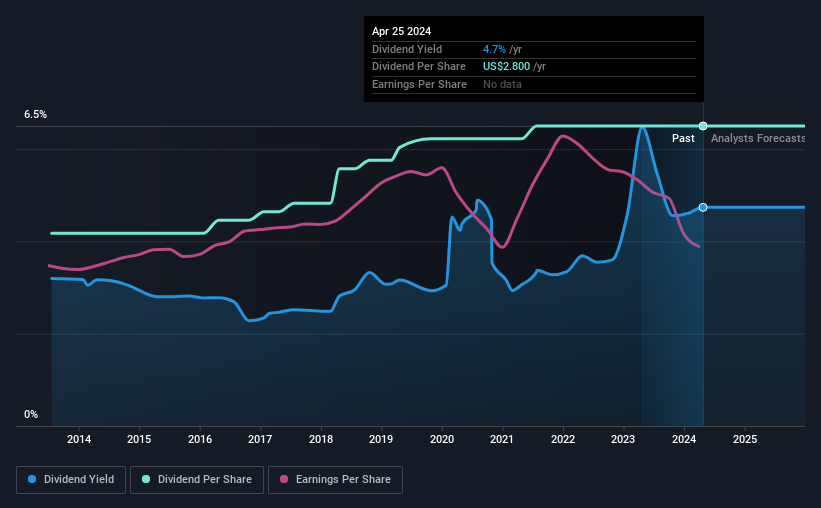
Bank of Hawaii Corporation (NYSE:BOH) will pay a dividend of $0.70 on the 14th of June. This means the annual payment is 4.7% of the current stock price, which is above the average for the industry.
See our latest analysis for Bank of Hawaii
Bank of Hawaii's Earnings Will Easily Cover The Distributions
While it is great to have a strong dividend yield, we should also consider whether the payment is sustainable.
Bank of Hawaii has established itself as a dividend paying company with over 10 years history of distributing earnings to shareholders. Based on Bank of Hawaii's last earnings report, the payout ratio is at a decent 72%, meaning that the company is able to pay out its dividend with a bit of room to spare.
Looking forward, earnings per share is forecast to rise by 2.4% over the next year. If the dividend continues on this path, the future payout ratio could be 75% by next year, which we think can be pretty sustainable going forward.

Bank of Hawaii Has A Solid Track Record
The company has a sustained record of paying dividends with very little fluctuation. The annual payment during the last 10 years was $1.80 in 2014, and the most recent fiscal year payment was $2.80. This implies that the company grew its distributions at a yearly rate of about 4.5% over that duration. Dividends have grown relatively slowly, which is not great, but some investors may value the relative consistency of the dividend.
Dividend Growth Is Doubtful
The company's investors will be pleased to have been receiving dividend income for some time. However, things aren't all that rosy. Over the past five years, it looks as though Bank of Hawaii's EPS has declined at around 6.6% a year. Declining earnings will inevitably lead to the company paying a lower dividend in line with lower profits. Earnings are predicted to grow over the next year, but we would remain cautious until a track record of earnings growth is established.
In Summary
In summary, we are pleased with the dividend remaining consistent, and we think there is a good chance of this continuing in the future. While the payments look sustainable for now, earnings have been shrinking so the dividend could come under pressure in the future. Taking all of this into consideration, the dividend looks viable moving forward, but investors should be mindful that the company has pushed the boundaries of sustainability in the past and may do so again.
It's important to note that companies having a consistent dividend policy will generate greater investor confidence than those having an erratic one. At the same time, there are other factors our readers should be conscious of before pouring capital into a stock. As an example, we've identified 1 warning sign for Bank of Hawaii that you should be aware of before investing. Is Bank of Hawaii not quite the opportunity you were looking for? Why not check out our selection of top dividend stocks.
If you're looking to trade Bank of Hawaii, open an account with the lowest-cost platform trusted by professionals, Interactive Brokers.
With clients in over 200 countries and territories, and access to 160 markets, IBKR lets you trade stocks, options, futures, forex, bonds and funds from a single integrated account.
Enjoy no hidden fees, no account minimums, and FX conversion rates as low as 0.03%, far better than what most brokers offer.
Sponsored ContentValuation is complex, but we're here to simplify it.
Discover if Bank of Hawaii might be undervalued or overvalued with our detailed analysis, featuring fair value estimates, potential risks, dividends, insider trades, and its financial condition.
Access Free AnalysisHave feedback on this article? Concerned about the content? Get in touch with us directly. Alternatively, email editorial-team (at) simplywallst.com.
This article by Simply Wall St is general in nature. We provide commentary based on historical data and analyst forecasts only using an unbiased methodology and our articles are not intended to be financial advice. It does not constitute a recommendation to buy or sell any stock, and does not take account of your objectives, or your financial situation. We aim to bring you long-term focused analysis driven by fundamental data. Note that our analysis may not factor in the latest price-sensitive company announcements or qualitative material. Simply Wall St has no position in any stocks mentioned.
About NYSE:BOH
Bank of Hawaii
Operates as the bank holding company for Bank of Hawaii that provides various financial products and services in Hawaii, Guam, and other Pacific Islands.
Flawless balance sheet established dividend payer.
Market Insights
Community Narratives


